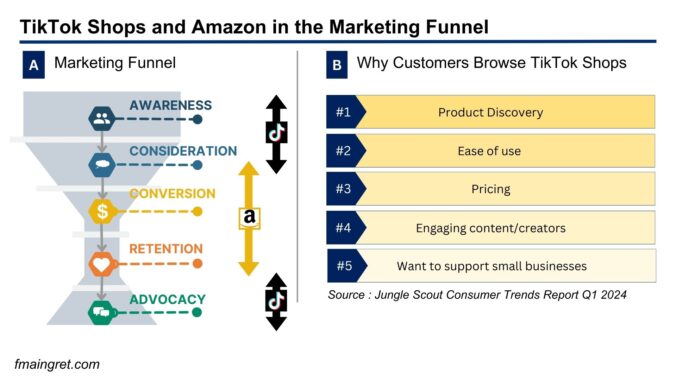Some people say Gen Z will riot if TikTok gets banned in the US. For me, I think business owners and marketing managers have more reasons to be upset. While the major news focuses on geopolitics and the assumed threat regarding data security, I feel that the impact on US businesses is overlooked.
It would be a mistake to assume banning a Chinese app would only have positive consequences for US businesses. Keep in mind that I am not advocating for or against the ban. I understand that this is more complicated than my small area of expertise in e-commerce. But brands should be aware of the consequences of a potential ban so they can prepare for an uncertain future.
So let’s jump to the top three reasons, in no specific order, why I think banning TikTok could seriously hurt some local businesses.
The consequences for sellers
Less Alternatives to Amazon/Walmart
As you know, the e-commerce landscape in the US is dominated by Amazon. According to eMarketer, Amazon will account for 40.4% of US retail e-commerce sales or a total of $491.65 billion this year. So much that thousands and thousands of businesses are heavily dependent on the Seattle giant for their survival.
On the other hand, TikTok is not only a unique social media, the relatively recently launched feature TikTok shops has seen impressive success in the US. A Junglescout study shows that 20% of Amazon sellers are planning to expand to TikTok Shop this year. This doesn’t include the brands already selling on TikTok shops.
While there is a large proportion of TikTok shops customers also shopping on Amazon, taking TikTok shop away would limit brands in their ability to diversify their sales channels and rely less on Amazon for revenues.
TikTok Shops Addresses a Different Stage of the Marketing Funnel
Talking about Amazon, it is clear that both channels address different stages of the marketing funnel.
When customers shop on Amazon, they often have a good idea of what they want. “I need a Barbie costume for Halloween”. Sometimes they even know what brand they want, and search for the product and the brand they typically purchase. Customers tend to be already lower in the marketing funnel when opening the Amazon app than when they scroll on TikTok.
On the other hand, TikTok is great for product discovery. People find stuff they had no idea they needed in the first place (the Awareness stage). Or they search for recommendations on some products they are in the market for (Consideration stage). According to another Jungle Scout report, nearly 20% of consumers began their search for products on TikTok in Q1 2023. While 56% of all consumers still preferred to start their product search on Amazon, 40% of the Gen Z demographic preferred TikTok over Google. Amazon tried to offer a TikTok-style shopping feed with its feature Inspire without much success.

A TikTok ban would decrease the options for brands to address the top of the funnel, and it isn’t clear where each brand’s TikTok audience will go for product discovery. Instagram (and to a lesser extend Youtube) is an option, but it doesn’t feel like TikTok.
Finally, an often overlooked stage is the “Advocacy”: people love to share their opinion on TikTok. I am not talking about sponsored posts and ads, but genuine product reviews. A ban would be one less channel for brands to have their product showcased and recommended within communities.
Brands Losing Part of Their Audience
If TikTok was banned in the US, it would be a pain for the brands that invested heavily in building an audience and a community on social media. For those working with specific influencers, it could be difficult to pivot to other media if their favorite influencers don’t have a strong presence outside of TikTok.
According to social media consultant Matt Navarra, “The level of engagement with their content is hard to replicate the same way on other platforms.” He also says that other platforms like Instagram and YouTube offer similar reach, but a TikTok ban could cause anxiety for hardcore TikTok users.
Of course, most brands are active on multiple channels (Instagram, Youtube, etc.), are cross-posting their Reels and Shorts and interacting with their followers. But there isn’t a perfect overlap between their audience on these channels, and a ban of TikTok would most likely significantly decrease many brands following.
Can TikTok Still Avoid a Ban?
TikTok could potentially avoid a ban if its parent company ByteDance sells it. However, the timeframe to reach an agreement is relatively short at only 180 days. Not only are there concerns regarding the involvement of the Chinese government, the cost of this acquisition would be massive. Only the largest companies like Google or Meta can afford it, but it would be questionable under antitrust laws. Google owns Youtube and Meta owns Instagram, two of the most popular apps for short videos. Other candidates like Amazon, Apple or Microsoft may have a better chance, but some industry experts are skeptical.
As a result, the future is uncertain for TikTok. Brands must prepare for a ban, even if it isn’t confirmed at this time. And if it does get banned, the future of e-commerce is also uncertain. Will traffic move to Youtube and Instagram? What media will use Gen Z to discover new products? And what will the typical customer journey look like without TikTok shops? Only time will tell.
https://abcnews.go.com/Business/tiktok-avoid-potential-ban-sale-buy/story?id=108075804
https://www.businessinsider.com/senate-passes-tiktok-ban-2024-4

